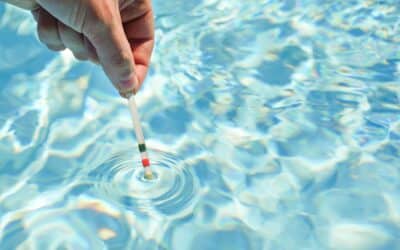Hosting a pool party or even just a few swimmers over can introduce more than just fun to your pool—it can also introduce a variety of contaminants. Not only can these cause cloudiness or discolouration, but they also influence your pool’s pH balance, which is critical for maintaining swimmer comfort and pool health. Regular testing and proper maintenance are essential to ensure your pool stays clear, clean, and safe for everyone to enjoy.
Common Contaminants Introduced by Swimmers
Cooling off in a pool on a hot day is a source of excitement for your guests, but it also means they are entering your pool with various contaminants that you can’t always see. The most common types of dirt and grime include:
- Body oils;
- Lotions and sunscreens;
- Sweat;
- Urine;
- Hair;
- And skin cells.
Some of these contaminants work faster in your pool than others, causing an obvious and immediate impact on your pool’s water quality by making it cloudy or discoloured. However, they can also affect your pool’s pH balance, which won’t be as immediately visible.
Maintaining the Ideal pH for Swimmer Comfort
Your pool’s pH balance is measured on a 14-point scale, from acidic at 0 to alkaline at 14. The acceptable range for a swimming pool is between 7.2 and 7.8, with the ideal range between 7.4 and 7.6.
Anything that enters your pool and causes it to be more acidic or more alkaline than normal will affect this number. The compounds from sweat, for example, are acidic and will lower that number. In turn, if your pool water is too acidic, it will sting your nostrils and eyes and dry out your skin and hair. On the other hand, water that’s too alkaline can cause skin irritation and scale buildup in the pool.
Recommended Chemical Ratios for Optimal Pool Health
To maintain your pool’s water quality and ensure it’s safe for swimmers, it’s important to manage not just the pH but also other key chemical parameters. Here’s a breakdown of the ideal chemical ratios for a well-maintained pool:
- Chlorine Levels: Chlorine is essential for disinfecting your pool and killing bacteria and algae. The ideal free chlorine level should be between 1.0 and 3.0 ppm (parts per million). During heavy use, like after a pool party, you may need to shock the pool with a higher dose to restore the appropriate chlorine levels quickly.
- Total Alkalinity: Alkalinity acts as a buffer for the pH level, preventing drastic changes. The ideal range for total alkalinity is 80 to 120 ppm. If alkalinity is too low, pH levels can fluctuate more easily, while high alkalinity can lead to cloudy water and scaling.
- Calcium Hardness: Calcium hardness measures the amount of calcium dissolved in the water. Keeping it in the correct range, 200 to 400 ppm, helps prevent corrosion of pool surfaces and equipment. Low calcium levels can lead to etching and pitting, while high levels can cause scaling and cloudy water.
Best Practices for Pool Owners to Manage Chemistry
As a pool owner, you should regularly rest and adjust your pool’s chlorine, pH, and alkalinity levels. At a minimum, you should be testing twice a week and more often if you host a high volume of swimmers, either throughout the week or at a party. You can also use shock treatments on high-use days to help adjust the levels more quickly.
Consider asking swimmers to take a quick shower to rinse off before entering the pool, which can minimize contamination and the impact on your pool’s pH balance.
Keeping the Water Crystal Clear: Final Thoughts
Maintaining proper pool chemistry is essential for ensuring the comfort of swimmers and the longevity of your pool. While it’s impossible to completely prevent contaminants from entering, regular testing and adjustments to the water’s pH and chlorine levels can significantly reduce their impact.
At Benson Pools, we can help you be proactive about water quality and pool chemistry. Our services can ensure that your pool remains clean, safe, and inviting for all to enjoy. To learn more, contact us today.


